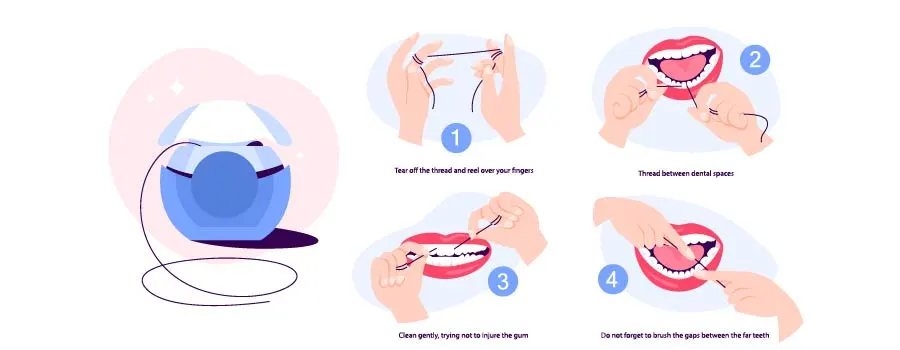Have you ever noticed that people who are meticulous about oral hygiene still end up visiting the dentist? The most common reason is the bacteria and plaque that accumulate in places your toothbrush can’t reach. Cleaning those hidden spots isn’t a dream—dental floss lets you quickly remove the bacteria clinging between your teeth.
Although dental floss looks like ordinary string, it’s manufactured to be strong enough to clean teeth yet soft enough not to damage your gums. Special materials make it glide smoothly between teeth for a more comfortable cleaning experience.
Many who care about oral hygiene still feel confused about using floss. In this article, you’ll find clear answers to the questions that cause uncertainty. Let’s get started!
What Is Dental Floss For?
Strong gum health depends on how well you care for your teeth. Most people know they should brush at least twice a day—but did you know you should also floss twice daily?
Dental floss is an essential tool for maintaining oral health. It cleans areas your toothbrush can’t reach and removes bacteria from your mouth. Beyond those basic functions, flossing also:
- Whitens teeth: A bright smile is key to dental aesthetics. Flossing helps you maintain naturally white teeth.
- Fights bad breath: Unpleasant breath can harm your social life and self-esteem. Regular flossing leaves you with fresher breath and greater confidence.
- Improves dental health: By preventing bacteria buildup between teeth, flossing contributes positively to your overall oral health.
- Reduces gum inflammation risk: Bacteria and plaque irritate gums and can lead to inflammation. Flossing minimizes this risk.
How Do You Use Dental Floss?
 Once you understand the benefits of floss, you may wonder how to use it correctly. Follow these steps for effective, proper flossing:
Once you understand the benefits of floss, you may wonder how to use it correctly. Follow these steps for effective, proper flossing:
- Wrap the floss around your index or middle fingers on both hands.
- Hold it taut between your thumbs and index fingers.
- Gently slide the floss between your teeth, curving it into a C-shape against one tooth.
- Move it slowly up and down to clean.
- Repeat for each tooth.
Discard used floss—reusing it can spread bacteria.
When Should You Floss?
Dentists say oral bacteria multiply more during sleep. You might go to bed with four billion bacteria and wake up with eight billion! Therefore, flossing routines differ morning and night. In the morning, floss right after waking. In the evening, floss after dinner.
Why Is Flossing Important?
Most people know they need to brush regularly, but few make flossing part of their daily routine. Yet flossing offers these key benefits:
- Prevents tooth decay: Food trapped between teeth feeds bacteria that form tartar—a primary cause of decay. Floss removes plaque and helps prevent cavities.
- Lowers gum disease risk: Flossing stops bacteria from irritating gums.
- Eliminates bad breath: Food debris in areas your brush can’t reach causes odor. Flossing ensures a fresher, cleaner mouth.
Frequently Asked Questions About Dental Floss
How many times a week should I floss?
Every day—flossing daily is recommended.
What type of floss should I use?
Choose floss based on your needs:
- Thickness: If your teeth are tightly spaced, avoid thick floss. Otherwise, thicker floss may work well.
- Braces compatibility: If you have braces, use floss designed for orthodontic appliances.
- Special features: If you need a built-in pick, choose floss with a handle; otherwise, standard floss will do.
Do benefits from flossing show immediately?
Yes—your mouth will feel cleaner and fresher as soon as you floss.
Why do my gums bleed when I floss?
Bleeding is usually due to improper technique. Take a break for a few days, then try again with gentle, correct flossing. If bleeding continues—even when brushing—see your dentist.
How many times can I use one piece of floss?
Floss is single-use. Do not reuse it.
Can I floss every day?
Absolutely—daily flossing is ideal.
Does floss remove tartar?
If the tartar is in its early stages, floss can help remove it.


















































